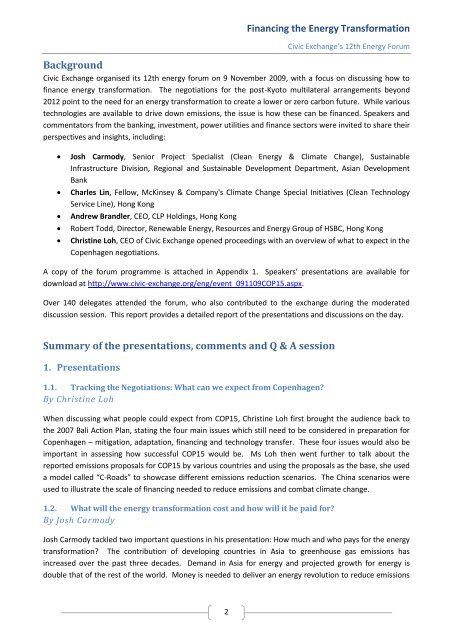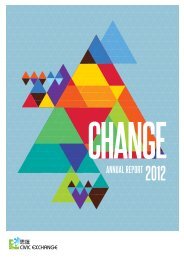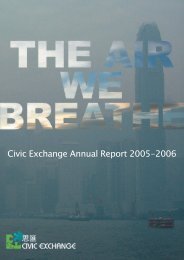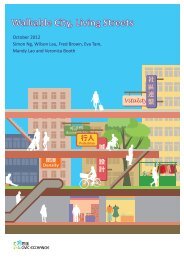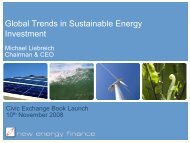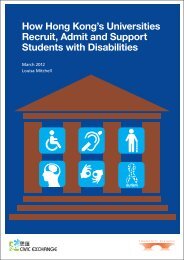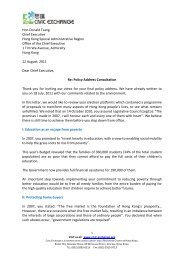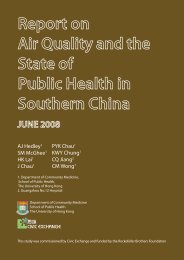Financing the Energy Transformation - Civic Exchange
Financing the Energy Transformation - Civic Exchange
Financing the Energy Transformation - Civic Exchange
You also want an ePaper? Increase the reach of your titles
YUMPU automatically turns print PDFs into web optimized ePapers that Google loves.
<strong>Financing</strong> <strong>the</strong> <strong>Energy</strong> <strong>Transformation</strong><strong>Civic</strong> <strong>Exchange</strong>’s 12th <strong>Energy</strong> ForumBackground<strong>Civic</strong> <strong>Exchange</strong> organised its 12th energy forum on 9 November 2009, with a focus on discussing how tofinance energy transformation. The negotiations for <strong>the</strong> post-Kyoto multilateral arrangements beyond2012 point to <strong>the</strong> need for an energy transformation to create a lower or zero carbon future. While varioustechnologies are available to drive down emissions, <strong>the</strong> issue is how <strong>the</strong>se can be financed. Speakers andcommentators from <strong>the</strong> banking, investment, power utilities and finance sectors were invited to share <strong>the</strong>irperspectives and insights, including:Josh Carmody, Senior Project Specialist (Clean <strong>Energy</strong> & Climate Change), SustainableInfrastructure Division, Regional and Sustainable Development Department, Asian DevelopmentBankCharles Lin, Fellow, McKinsey & Company's Climate Change Special Initiatives (Clean TechnologyService Line), Hong KongAndrew Brandler, CEO, CLP Holdings, Hong KongRobert Todd, Director, Renewable <strong>Energy</strong>, Resources and <strong>Energy</strong> Group of HSBC, Hong KongChristine Loh, CEO of <strong>Civic</strong> <strong>Exchange</strong> opened proceedings with an overview of what to expect in <strong>the</strong>Copenhagen negotiations.A copy of <strong>the</strong> forum programme is attached in Appendix 1. Speakers’ presentations are available fordownload at http://www.civic-exchange.org/eng/event_091109COP15.aspx.Over 140 delegates attended <strong>the</strong> forum, who also contributed to <strong>the</strong> exchange during <strong>the</strong> moderateddiscussion session. This report provides a detailed report of <strong>the</strong> presentations and discussions on <strong>the</strong> day.Summary of <strong>the</strong> presentations, comments and Q & A session1. Presentations1.1. Tracking <strong>the</strong> Negotiations: What can we expect from Copenhagen?By Christine LohWhen discussing what people could expect from COP15, Christine Loh first brought <strong>the</strong> audience back to<strong>the</strong> 2007 Bali Action Plan, stating <strong>the</strong> four main issues which still need to be considered in preparation forCopenhagen – mitigation, adaptation, financing and technology transfer. These four issues would also beimportant in assessing how successful COP15 would be. Ms Loh <strong>the</strong>n went fur<strong>the</strong>r to talk about <strong>the</strong>reported emissions proposals for COP15 by various countries and using <strong>the</strong> proposals as <strong>the</strong> base, she useda model called “C-Roads” to showcase different emissions reduction scenarios. The China scenarios wereused to illustrate <strong>the</strong> scale of financing needed to reduce emissions and combat climate change.1.2. What will <strong>the</strong> energy transformation cost and how will it be paid for?By Josh CarmodyJosh Carmody tackled two important questions in his presentation: How much and who pays for <strong>the</strong> energytransformation? The contribution of developing countries in Asia to greenhouse gas emissions hasincreased over <strong>the</strong> past three decades. Demand in Asia for energy and projected growth for energy isdouble that of <strong>the</strong> rest of <strong>the</strong> world. Money is needed to deliver an energy revolution to reduce emissions2


